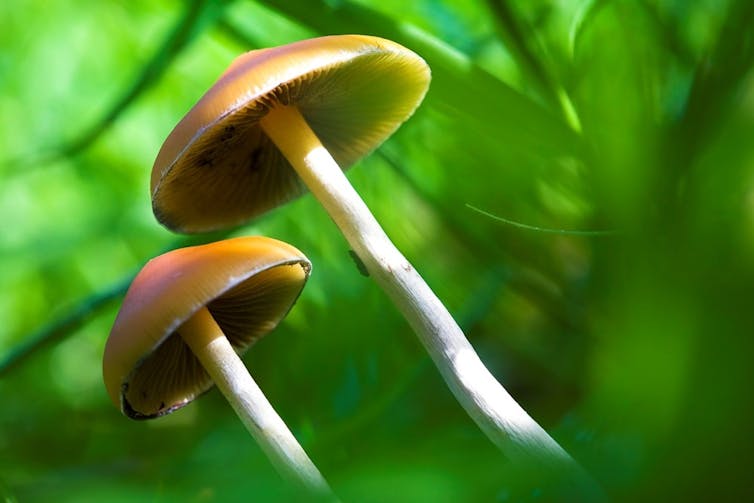What's Old is New Again
"It [psychedelic drug trials] raises the caution that the investigation of hallucinogens as treatments may be endangered by grandiose descriptions of their effects and unquestioning acceptance of their value."
"Timothy Leary was a research psychologist before he decided the whole world should 'Turn on, tune in and drop out'. It is best if some steps are not retraced."
Dr. Guy Goodwin, professor of psychiatry, Oxford University
 |
"I was so depressed. I felt that the world had abandoned me that I'd lost the right to exist on this planet."
"I experienced this kind of unity, of resonant love [in a trial with a heavy dose of psychedelics], the sense that I'm not alone anymore. I felt welcomed back to the world."
"I think that trial was the single most effective thing I've done to manage my mental health, and I had tried almost everything."
Rachael Peterson, 29, Maryland, U.S.
"Now we have the core funding and infrastructure to really advance psychedelic science in a way that hasn't been done before."
"That [MEQ: 'mystical experience questionnaire'] was a significant branding mistake, because awe is not fun."
"There's something existentially shaking about these experiences."
Roland Griffiths, neuroscientist, Johns Hopkins
 | ||||
| Johns Hopkins is launching a new Center for Psychedelic and Consciousness Research |
Johns Hopkins Medicine launched its new Center for Psychedelic and Consciousness Research in the study of compounds such as LSD and psilocybin as experimental potential aids in dealing with a range of mental health problems, including anorexia, addiction and depression. As the first of its kind in the U.S., all eyes will be fixed on the new Center's progress. Johns Hopkins has been enabled to proceed with this ambitious and controversial project after having received a commitment to the value of $17 million from a foundation and private donors.
By no means is this the first such center worldwide studying the potential benefits of psychedelics in the treatment of various mental illnesses. Imperial College London had launched the world's first center of its kind back in April, aided with $3.5 million from private funding sources. Both new centers are set to lead the way in "psychedelic medicine", an elusive but long-considered foothold with the acceptance of legitimacy in the scientific establishment. The exploration of the potential of psychedelics and other recreational drugs to aid in psychiatric problems dates to the early 2000s.
Two books and positive headlines were generated out of these early initiatives, attractive enough to researchers to inspire them to study the effects of psychedelics on people suffering from mental illness in a more organized and thorough manner. The anaesthetic and club drug ketamine and related compounds which cause out-of-body sensations used in the treatment of depression has garnered interest as well in therapeutic aids in mind-altering states used to correct for mental illness.
 |
| TIBER and REBUS models suggest which psychedelic-assisted therapy may be beneficial |
While the evidence of these drugs' successful interventions is not yet convincing, causing many experts in the field to remain wary of their use, reports of improvements have yet to be standardized from the situation where it is not possible for trials with psychedelics to be 'blind'; simply put, participants, unlike most drug trials, are aware when they have been dosed. Acknowledging that situation, scientists at both centers feel the new infusion of funding will lead to clarity in identifying which drugs are useful to which patients, when the altered states are recognized as ineffectual, or where they become potentially dangerous.
Psilocybin, found in magic mushrooms, are among the first of the psychedelics chosen to take into trials for anorexia nervosa and psychological distress and cognitive impairment in early Alzheimer's disease. Since psychedelics can make people with a history of psychosis worse, they are excluded from participation in any trials. On the appointed day of treatment, the individual takes the drug while under continuous observation under the care of a therapist. In some trials, participants are given eyeshades and headphones, are instructed to lie down, and listen to music.
Thus far, the literature from such trials suggest that psilocybin looks promising as a protocol for chronic depression and addiction. And that M.D.M.A. (ecstasy) has the potential to help those with post-traumatic stress, veterans included. LSD and cannabis use in trials have brought in mixed results. What does appear universal in efficacy, is that positive effects are likelier to last longer should the participant experience an especially intense reaction to the psychedelics applied.
/cdn.vox-cdn.com/uploads/chorus_image/image/62810711/Psychedelic_legalization_lead_4.0.jpg)
Labels: Depression, Experiments, Medical Science, Mental Health, Psychedelic Drugs, Research

0 Comments:
Post a Comment
<< Home